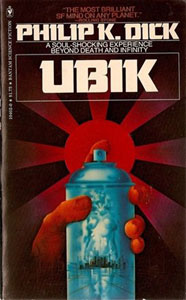The aspect I most remembered from my first read of “Ubik” (1969) is the inventive, chilling and comforting notion that people exist in a “half-life” for several years after they die, so we can continue to talk to and say goodbye our loved ones at our leisure.
But on this re-read I realized that covers like 10 percent of the fascinating ideas in this Philip K. Dick book that made me think of “The Matrix,” “The Langoliers” and various “Which of these two realities is real?” stories, including the “Buffy” episode “Normal Again” (Season 6, episode 17).
Blunt satire of advertising
With more bluntness than usual, PKD also aims for humor via blurbs at the start of each chapter that advertise something called Ubik. Because Ubik can be anything from deodorant to corn flakes, I started to think of it as a line of products put out by a company that’s ubiquitous, perhaps Dick’s commentary on corporatism, with Ubik having conquered all the competition by this point in the future. The author ultimately (probably) isn’t making that statement, although audience surrogate Joe Chip eventually makes the Ubik/“ubiquitous” connection.

“Ubik” (1969)
Author: Philip K. Dick
Genre: Science fiction
Settings: Earth and Moon, undated future
Playing with the idea of precognitives made famous by “Minority Report” (PKD’s 1956 short story that later became a film and TV show), “Ubik” features an ongoing battle between people with psychic abilities. Some work for Runciter, who is functionally the good guy because he’s the one we know, and some work for the off-panel Hollis. Both are corporate heads, although neither company is the mysterious Ubik.
The powers of these gifted people are varied, like the X-Men except that all their powers are in the mental realm. Among them is Pat, who can cause time to jump backward a short interval. So if something bad happens in her vicinity, she can use her power to functionally erase it.
Chip, for his part, is simply a recruiter for Runciter, and he’s had such a hard go of it lately that he can’t afford the quarter to open his conapt door. He’d be trapped in his own conapt if friends didn’t lend him their spare change. This also ties into the theme of a giant corporation that’s the last monopoly standing: It controls and monetizes everything. But Chip gradually grows beyond the sad-sack protagonist and is eventually the audience surrogate; it doesn’t matter who he is, it matters what he’s experiencing.
His experiences alone are enough for a meaty book, because PKD’s world-building (or world-regressing) is so good. Chip sees things “reverting” to previous states (a modern TV reverts to an old-time radio, for instance) to the point where he and his colleagues have eventually gone from present-day 1992 to 1939. In a particularly harrowing sequence, Chip desperately tries to make it to his hotel room, struggling up the stairs, before he deteriorates. He has already seen one friend turn into a fragile husk and crumble.
Pivotal moment on the Moon
Things such as coffee and cream that are stuck in a stale state made me think of Stephen King’s “The Langoliers,” and of course “The Matrix” parallel is, well, ubiquitous. “Ubik’s” pivotal moment is an explosion on the Moon that seemingly kills Runciter but leaves his employees alive — or is it the other way around?
If Chip and his associates are actually in the false reality, it makes us rethink the idea of the half-life loved ones in cold storage. From our perspective, it’s nice to call them up and talk to them, and imagine they are peacefully sleeping the rest of the time. But from their perspective, they might be living a whole ’nother life in their false (to us) reality.
As crazy and filled with ideas as “Ubik” is, PKD mostly plays fair with the reader. I liked the idea, introduced early on, that half-life in cold-pac could be lonely for Jory, whose loved ones don’t visit him; thus he infiltrates other people’s conversations, such as those between Runciter and his late wife, Ella. Not merely a fascinating and sad notion, this is an element to keep in mind when trying to figure out the novel’s mystery.
But the final chapter makes me rethink everything I’ve read, and it also calls to mind the “Buffy” episode “Normal Again.” In that episode, Buffy alternates between what we know as reality (the narrative we’ve been following on TV) and an alternate reality where she has been in a psych ward for six years, making up the narrative in her head. The final image shows Buffy in the psych ward, thus suggesting (but not necessarily confirming, as there are ways around this interpretation) that the TV series’ events are all in her head.
PKD pulls a similar trick when Runciter is surprised to discover the coins in his pocket bear the face of Joe Chip. By this point, “Ubik” has made it clear through numerous provers that Chip is in a half-life false reality created by Jory’s brainpower, whereas Runciter is alive in reality. So my initial impression is that this final chapter does not click into place.
Making an impact from cold-pac
It’s true that people in cold-pac can impact the real world (indeed, Ella is Runicter’s adviser, and we’re told Joe will take up that position once Ella gets reincarnated), so Joe could theoretically become famous enough (even in half-life) to have his face on money. But that wouldn’t explain Runciter’s surprise.
Even if we add Pat’s time-jumping-into-the-past powers into the equation, or the late-addition notion of reincarnation, I don’t think that explains Runciter’s surprise, since he would’ve already been living in a reality with a famous Joe Chip.
One possibility is that this Runciter is having his reality washed over by the “new” reality. If Runciter’s memory of the weirdness of the money persists after the book ends, then that doesn’t fit. If he gradually forgets about the weirdness of the money, this is indeed a plausible explanation. I don’t know if PKD gives us enough information about how people experience a changing reality (although possibly he does in an early segment illustrating Pat’s power, the most confusing part of the novel).
At first blush, I’d say “Ubik” doesn’t stick the landing with that final kicker. But the rest of the book is such a delightful mix of ideas about the nature of reality, the progression of time, and the power of the mind – not to mention some clever and funny (if perhaps accidental) warnings about corporatism – that I suspect maybe that final chapter works on a level my mind’s not powerful enough to comprehend.


